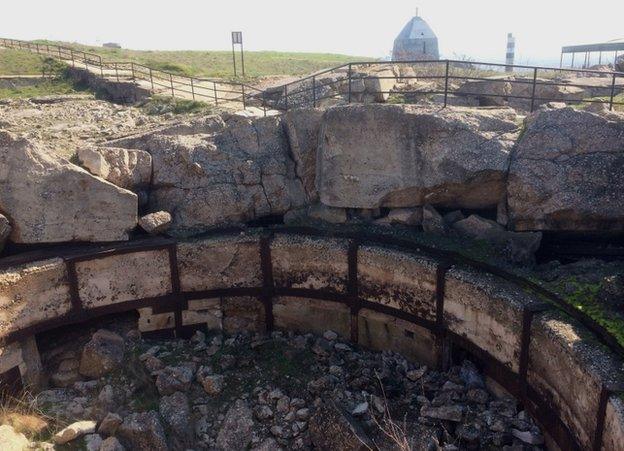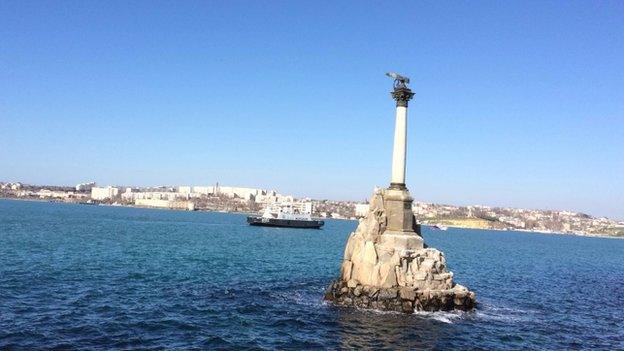Ukraine crisis: A guide to Russia's vision of Crimea
- Published

Soviet troops were driven into the sea at the site of the 35th Battery in Sevastopol
When Russia annexed Crimea from Ukraine this month, the Kremlin must have calculated that whatever the consequences abroad, it would be a popular move at home as well as in Crimea itself.
Russian bonds to the peninsula stretch back more than two centuries, over a timeline punctuated by bloody sieges of Sevastopol.
One remark you constantly hear is that Crimea is historically "steeped in Russian blood". Another important tie, less tragic, goes back to pre-Tatar, medieval times.
It is a lot to take in, but who better to reveal this rich history than a veteran Sevastopol tour guide?
Last stand
In Soviet times, Alexander Ivashevsky led busloads of tourists on nine-hour excursions around the "city of 1,500 monuments", following an approved trail and keeping more or less to an approved commentary.
Now aged 64, the retired guide agreed to draft his own tour, in half the time.
His first stop is the 35th Battery, an underground coastal gun emplacement which saw ferocious fighting in June-July 1942, as Soviet troops made a last stand against the advancing Nazis.
A desperate attempt was made to evacuate through the battery's sea exits. Soldiers waited without drinking water on the rocks in the sun, as corpses of comrades floated around them.
Alexander Ivashevsky visits the site of the ancient Greek colony of Chersonesus in Sevastopol
For Mr Ivashevsky, the descent through the ruined battery's dank corridors is a solemn pilgrimage in memory of the war dead.
His next destination, the sun-drenched site of the ancient Greek colony of Chersonesus, is a more traditional kind of pilgrimage.
Amid the impressive Greek and Byzantine stone structures that litter Crimea's answer to Pompeii, a cathedral marks the spot where Vladimir the Great is said to have been baptised in the 10th Century.
As the ruler who brought Christianity to what are now Ukraine and Russia, he is revered by Orthodox Christians like Mr Ivashevsky, who inhales the air of Chersonesus like a tonic.
Lost empire
The third and final stop is on a hill in the very centre of Sevastopol - not the eye-catching statue of Soviet leader Vladimir Lenin there, but another cathedral, small and elegant.
Alexander Ivashevsky visits the Admiralty Cathedral in Sevastopol
Russian naval commanders killed during the Crimean War with Britain, France and Turkey were brought here for burial during the first siege of Sevastopol (1854-55), when the Admiralty Cathedral was still only being built.
Interred along with them is the Russian explorer Admiral Mikhail Lazarev, who commanded a ship on the Russian expedition which discovered Antarctica for the world in 1820.
Its facade still pocked by shell and bullet holes from the later war, the cathedral is one of a handful of buildings in Sevastopol to have survived World War Two,
It is a poignant link to Imperial Russia, a civilisation which melted into the Black Sea in 1920 with the evacuation of the tsarist White Army and the arrival of the Soviets.
First impression
Alexander Ivashevsky knows his stuff, but what does it matter to anyone below the age of 22 in Crimea?
There may be younger ethnic Russian Crimeans who wanted to stay in Ukraine, having never known any other country, he accepts. But he believes the "overwhelming majority" wanted reunification with Russia.

The port of Sevastopol is bound up in Russian naval history
For him, Ukraine is a "wicked stepmother" who promised Crimean Russians a better life after independence in 1992, then "deceived" them. In all those 22 years, he says, he "never felt Ukrainian".
The deciding factor for Mr Ivashevsky this winter was the new Ukrainian parliament's attempt to remove the status of Russian as an official second language.
While that attempt was quickly blocked by the new president, "first impressions count", as another ethnic Russian put it.
Contending controversially that everyone in Ukraine understands Russian, an indignant Mr Ivashevsky asks: "Is there any other country on Earth where a language understood by 100% of the population is not a language of state?"
What, he asks, is an old woman to do when she goes to buy medicine in a chemist's shop and cannot read the instructions because they are written in Ukrainian? Why not a multilingual Ukraine like Canada or Switzerland?
Garden tour
Alexander Ivashevsky's wife is from Ukraine and all her roots, all her extended family, are there. She did not welcome the referendum on joining Russia and she is now very worried, he says.
Strictly speaking, the first stop on the excursion was a charming garden the couple had cultivated together in the courtyard of the block of flats where they live: almond, walnut and cherry trees.
"Enough walnuts to feed our pet Belgian rabbit all winter," according to a proud Mr Ivashevsky.
Of course, trees depend on water and Crimea depends on Ukrainian pipes for its water and energy supplies.
Mr Ivashevsky expects the next few years to be hard but he remains hopeful. For a Crimean with a keen sense of history, he evidently tries to keep things in proportion.